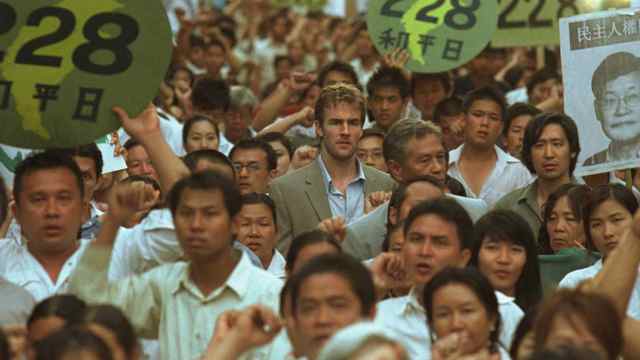Wait – it’s the author of this article in the Global Times that draws the comparison of an outrageous show for kids at the Summer Palace with Quentin Tarantino’s film. And the analogy is spot-on. This is wild and crazy stuff.
The lotus flowers are in bloom at the Old Summer Palace, a magnificent royal compound destroyed twice by foreigners, in 1860 and 1900.
This catastrophic loss to the world’s cultural heritage occurred more than a century ago, but the ruins loom large as a central symbol of China’s humiliation at the hands of Westerners.
I saw first-hand an example of how this sense of indignity and outrage is kept alive during a stroll on a summer evening, when I stopped and watched the shadow puppet show The Legend of Yuanmingyuan.
….Watching the show, I was confused by what was happening before me. In battle after battle, Chinese soldiers and villagers used martial arts and tricks to defeat the buffoonish French and British invaders.
The foreigners got hatchets in the face, spears in the eye, and bayoneted repeatedly while lying helpless on the ground. Wily Chinese fighters jumped into the air, causing foreign troops to accidentally kill each other… I was wondering if I had stumbled upon China’s answer to Inglourious Basterds, the Quentin Tarantino revenge fantasy in which a group of Jews scalp dozens of Nazis and then kill Hitler.
The delightful show has an obvious intent: to generate in impressionable children as much rage against foreigners as possible.
In The Legend of Yuanmingyuan, the foreigners’ only motivation is greed and spite. When they first enter a Chinese village near the start of the show, a soldier says, “Let’s steal everything.” His commander replies, “Stop it. We shouldn’t act in haste because Chinese people are smart. You don’t know how smart they can be.”
To the laughter of the children and adults in the audience, the solders mispronounce the names of their own countries, for example, saying they are from the country of “Epilepsy” rather than the near-homonym Great Britain.
During one comical scene, soldiers fight over the loot from the Old Summer Palace, staggering like drunkards with their heavy load. The soldiers, played by real pint-sized actors on stage, are so venal that they reach off the stage into the crowd to find even more things to steal, grabbing at audience member’s mobile phones. One foolish soldier, intent on stealing everything that isn’t screwed down, burns his hands trying to steal one of the stage’s footlights….
One of the most disturbing things about watching this spectacle was seeing little people teaching little people how to hate. At the end of the show, the children in the audience were invited onstage to pose with the actors. To my surprise, it was announced that the performers were not children at all, but adults suffering from dwarfism, with an average age of 22 and an average height of 1.26 meters (4 feet). Their particular form of dwarfism makes them resemble children.
…[A spokesman] called the show “very good patriotic education,” and added, without a trace of irony, “It’s a pity that no one knows the history in detail.”
Kudos to the Global Times for running a piece that makes this look like the cheapest, most vulgar and nauseating propaganda. As the writer points out, the park’s Chinese and English web sites have very different copy. The hysteria and anti-foreign sentiments somehow got airburshed out of the English translation.
We really do have to give the writer credit:
Hatred, like forgiveness, can be taught, and hanging on to hurt and outrage is the central message of this show.
To be sure, a clear-eyed look at the history surrounding the Old Summer Palace and the collapse of the Qing Dynasty offers many lessons in arrogance, barbarism, and how regimes rise and fall from power. These lessons are valuable today.
But these lessons were far from the caricatures of history I witnessed in this show. Beyond the looting and destruction of the palace by foreigners amid war as the Qing emperor fled, there was little in the way of history. This puppet show, of course, is hardly unique, but instead a very normal example of the methods by which past hurts are nurtured for purposes that have nothing to do with understanding the past and everything to do with fueling nationalism.
The looting of the Summer Palace is one of those third-rail topics that I learned long ago to avoid at all costs. It’s one where I’m tempted to use the “b” word (it rhymes with “train quash”), and this show confirms it’s justified. The looting was a shameful thing. But to carry that much anger in their breasts nearly a century and a half after the fact is bizarre. But it’s not bizarre – it’s cultivated at a young age when kids are at their most impressionable, and it perpetuates the stereotype of victimhood and keeps it fresh and raw. A friend of mine once talked about it to me with tears in her eyes, as if it happened last week. I just listened, knowing there was nothing I could say except that I understand and sympathize.

Comments